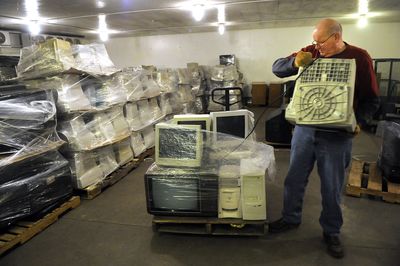E-waste finds a home
Companies financing state-sponsored program that recycles personal, small-business electronics

Thousands of pounds of old computers, TV sets and monitors have begun their final journey, landing in the warehouses of Spokane-area recyclers who are part of Washington’s groundbreaking electronic waste law.
Passed by the Legislature in 2006, the recycling system went into effect Jan. 1.
It allows individuals and small businesses to drop off old computers, monitors, TVs and laptops at designated collection sites free of charge. Those collectors will be paid a per-pound fee for handling the products, which will go to processors in Western Washington, Portland and Southern California.
Individuals and businesses with fewer than 50 employees can drop off equipment free; otherwise, disposal fees would run $10 to $40.
Collectors that gave advance notice to customers about the program were already seeing a response.
Recycle Techs in Spokane Valley is among the companies that joined the program.
“We’ve been telling our customers for some time we would do this,” owner Erik Bisiar said. And now the company has 15 pallets loaded with electronic equipment for recycling, he said.
Statewide, about 200 companies and nonprofits accept e-waste under the free program. Spokane County has 17 participants so far.
Officials in charge of the program estimate about 24 million pounds of electronics will move to processors under the program.
Ultimately, consumers will likely pay the cost of handling those materials. A state agency determines the volume of electronic equipment major manufacturers such as Dell and Apple sell in Washington, then calculate a fee each must pay to support the program.
That doesn’t mean Apple, Dell and other companies will raise the price for notebooks just in this state, said John Swiderski, chairman of the Washington Materials Management and Financing Authority.
“Each manufacturer might raise the cost of a laptop 1 cent across the country,” said Swiderski, whose group includes representatives of electronics companies.
Manufacturers would prefer a national program resembling the one adopted by Washington, Swiderski said. “It’s easier to organize and manage a national plan, rather than micromanage a host of different state plans,” he said.
Washington is one of the first states to implement a system that shifts the cost to manufacturers and spares consumers the direct cost of paying a recycler to dispose of equipment.
For now, the law doesn’t apply to keyboards, mice, printers, modems or fax machines, all of which can be recycled at area collectors for a fee.
And the law doesn’t require every electronics recycler to use the program. One company that may join is Earthworks Recycling in Spokane. Owner and President Jim Schrock said he hopes to negotiate a better rate than the state offered.
Each collector, like Schrock, negotiates its own rate of payment from the Materials Management and Financing Authority, Swiderski said.
Earthworks charges $20 to $45 per TV set if consumers drop them off. Now that consumers have a no-cost disposal option, Schrock said, Earthworks will see a decrease in business. “But overall, those electronics items come to about 2 percent of our total volume of recyclables,” Schrock said. “So the impact for us is not major.”
Among the 17 free electronics recyclers in Spokane County is Goodwill Industries of the Inland Northwest. The nonprofit has designated all 11 of its Spokane locations as e-waste collection points.
Other drop-off points include the Salvation Army stores on North Division Street and in Spokane Valley.
After publicizing the program, Spokane-area Goodwill stores have amassed roughly 15,000 pounds of TVs, computers and monitors, local President Clark Brekke said.
Goodwill soon will ship two trailers to a West Side processor, Brekke said.
Total Reclaim in Seattle, has handled electronic components for more than 30 years.
“King, Pierce and Snohomish counties have already put in place bans for electronics in landfills,” Total Reclaim co-owner Craig Lorch said. “So we’ve already been seeing the bump in equipment (being recycled) on this side of the state.”
Most items from recycled electronics find their way to commodity users worldwide, Lorch said. Metals largely go to Europe, while plastics and glass generally go to Asia, he said.